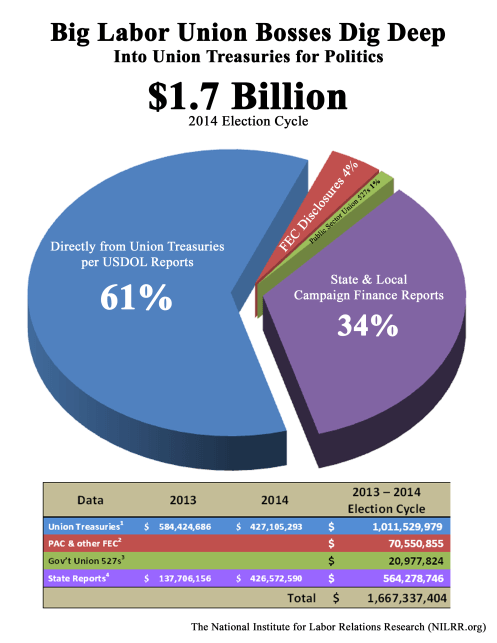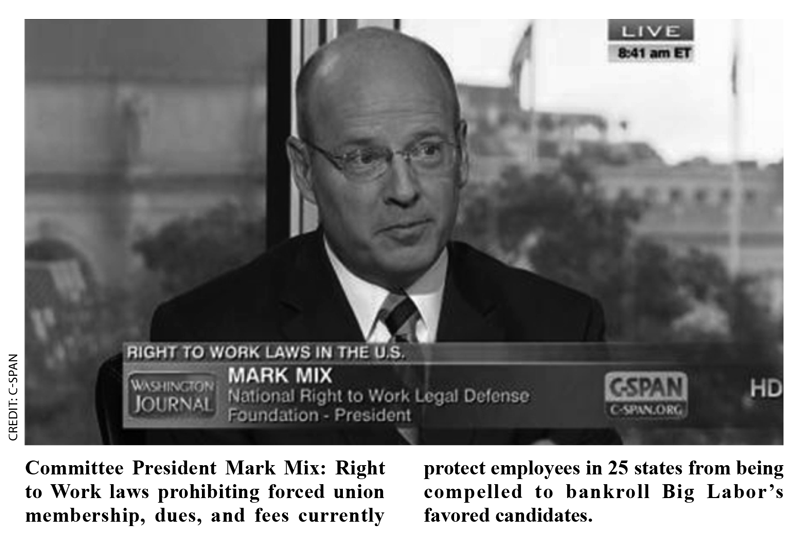Is This Any Way to Run a City’s Schools?
Leaked CTU Proposals Won’t Do Anything to Improve Schools’ Poor Performance
Big Labor Poured $1.7 Billion Into Politics/Lobbying in 2013-2014
(Source: May 2015 National Right to Work Newsletter)
Drawing on a variety of published sources, the National Institute for Labor Relations Research has recently estimated that Big Labor spent roughly $1.7 billion on politics and lobbying in 2013 and 2014.
An Institute fact sheet published on April 8 relies almost entirely on reporting forms filed by union officials themselves with federal and state government agencies.
Poor-mouthing union officials and supposedly “nonpartisan” monitors of political spending like the Center for Responsive Politics (CRP) continue even today to foster the totally false impression that Big Labor PAC and Section 527 expenditures represent all the electioneering unions do.
But the LM-2 forms that private-sector and some government-sector unions with annual revenues exceeding $250,000 are required to file with the U.S. Labor Department, along with other publicly available resources, show they actually control by far the most massive political machine in America.
Forced Dues-Stocked Union Treasuries Finance Get-Out-the-Vote Activities
In 2003, then-President George W. Bush’s Labor Department revised LM-2 forms with the avowed goal of helping the millions of private-sector workers who are forced to pay union dues or fees as a job condition get a better idea of where their conscripted money is going.
This was a worthwhile initiative. Current labor laws, as interpreted by federal courts, unjustly authorize the firing of employees for refusal to pay for unwanted union monopoly bargaining, unless the employees are protected by a state Right to Work law.
But the U.S. Supreme Court, in precedents argued and won by National Right to Work Foundation attorneys, has made it clear time and again that employees may not legally be forced to pay for non-bargaining activities — regardless of where they live.
Unfortunately, in a misguided and futile attempt to appease the union brass, Bush officials failed to require union reports to strictly segregate all bargaining and non-bargaining activities in the revised LM-2’s.
Nevertheless, since the LM-2 revision withstood an extended Big Labor legal challenge and took effect, union officials have been required to report each year how much they spend on two major non-bargaining activities — electioneering and lobbying.
The Institute review of all LM-2 forms filed for 2013 and 2014 shows that unions filing such forms spent a total of $1.01 billion in union treasury money on “political activities and lobbying” over those two years alone.
Such forced dues-fueled spending pays for phone banks, get-out-the-vote drives, propaganda mailings, and other so-called “in-kind” support for union boss-favored candidates.
Many Deeply Political Unions Don’t Have to File LM-2’s
Big Labor political and lobbying expenditures reported on LM-2 forms are the single largest component of the union electioneering machine. But there is plenty LM-2’s don’t cover.
“Government unions that have no private-sector members, including many affiliates of the National Education Association teacher union and other deeply political state and local unions, don’t have to file LM-2’s,” noted Mark Mix, president of both the Foundation and the National Right to Work Committee.
“The Institute analysis added up political spending by such government unions appearing in state campaign finance reports and came up with 2013-2014 expenditures totaling $564 million.
“Union PAC and ‘527 group’ political expenditures not reported elsewhere add another $92 million to the 2013-2014 war chest.”
 Congress Obliged to Act
Congress Obliged to Act
“Unlike business and other interest-group political spending, Big Labor’s ‘in-kind’ expenditures on politics are financed primarily by forced-dues and forced-fee money, often paid by workers who aren’t union members and personally oppose the union-boss agenda,” Mr. Mix continued.
“Fortunately, Right to Work laws prohibiting forced union membership, dues, and fees currently protect employees in 25 states from being forced to bankroll Big Labor’s favored candidates and causes.
“But it remains Congress’s obligation to crack down on the outrage of forced-dues politicking and protect private-sector employees across the country. It can do so by passing a national Right to Work law that repeals the handful of provisions in federal labor law under which millions of employees are still being forced to bankroll unions.”

Leaked CTU Proposals Won’t Do Anything to Improve Schools’ Poor Performance

Wherever Big Labor wields the power to collect forced union dues, union bosses funnel a large share of the confiscated money into efforts to elect and reelect business-bashing politicians. Employment growth tends to lag as a consequence.

Members Insist They Keep Pro-Right to Work Campaign Promises